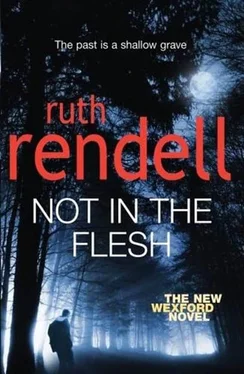Burden said coldly, “Can we return to Dusty? Where did he come from?”
It seemed that Maeve had decided Claudia had gone far enough. “He'd been one of those fruit-pickers that were on Grimble's Field…”
“Just a moment, Mrs. Tredown,” Wexford said. “Are we talking about eight years ago or eleven?”
“Eleven, of course. They weren't on the field eight years ago. This was '95. One day Dusty came through our garden when I was out there and asked if I'd any work for him. I said, was he any good as a mechanic because we'd got this car no one had driven for years and could he put it right and drive it for us. Well, he did and we paid him. There, does that satisfy you?”
“Not entirely, Mrs. Tredown. You say this was eleven years ago. Was it before Mr. Grimble and Mr. Runge turned the pickers off the field or afterward?”
“Afterward, of course, silly.” Claudia answered for her. “He wanted a job because he'd lost the one he'd got strawberry-picking. What else?” She returned to her curd-making, reaching the stage of placing a spoonful of the yellow mixture on a saucer to test if it had gelled. She watched it, sniffed it, nodded, said to Wexford, “Do you like lemon curd?”
“Very much,” he said, adding quickly, “but not now. When he'd fixed the car, he drove for you?”
“He took us shopping a few times and he did a bit of gardening. He put a washer on a tap.” Maeve shrugged. “You can't be interested in all these domestic details. He was only with us two or three weeks.”
“But he came back three years later?”
At last Wexford could see he and Burden had touched a sensitive nerve. Claudia held her spoon in midair for a second or two. Maeve, who had been feeling her husband's forehead in an unusual gesture of care, remained utterly still, her hand resting on the damp ocherish skin. It was the ex-wife who recovered first.
“Dusty came over to say hallo, that's all. He said he was getting married to a woman called Bridget.”
Those were perhaps the first serious sentences Wexford had ever heard uttered by Claudia Ricardo. “Did you give him any money?”
“As a matter of fact, we did.” Maeve took her hand from Tredown's brow. He had fallen asleep. “Things were very prosperous about then. The First Heaven had been a bestseller for a long time. Those were the days.” She glanced at the sleeping man. “He's never been able to write a sequel to come up to it. God knows why not. I gave Dusty a hundred pounds for a wedding present.”
“That was all?”
“I beg your pardon? He was bloody lucky to get that.”
“Where did the rest come from?”
Wexford watched the trickles of rain run down the big window in his office. The moving water distorted the trees outside to a melange of gold and brown. The sky was pale, colorless, all cloud. “She may be lying, Mike, and I wonder why. D'you realize, we don't even know his first name? We conclude from his nickname that he was called Miller and from the T-shirt that his first name was Sam. But that's guesswork. We know he's dead and Ronald McNeil killed him. Or to correct that, Irene McNeil says he killed him. We have to see Bridget Cook. Hannah can do that and pick her brains. She may know about the thousand pounds and she'll certainly know what Dusty's real name was.”
“I've never thought much of the tea we get in here,” Burden said, and with unusual and almost poetical exaggeration, “but compared with that muck Claudia gave us, it's the nectar of the gods.” He lifted the cup to his lips and savored the contents. “Excellent. A bit brutal what Maeve said about the sequels to that book of Tredown's not being very good.”
“She is brutal, but I'm afraid she's right.”
Burden raised his eyebrows.
“Dora fetched me two of his books from the public library, the recent ones, I mean. They're not a patch on The First Heaven. I didn't like The First Heaven, I don't like fantasy, but I could see it was good. I couldn't finish the others. I got halfway through one but couldn't finish it and I only managed one chapter of the other. The First Heaven ends with the coming of man to earth, that is man as we know him, not half an ape. In the first sequel-it's called In His Own Image and that says it all-he's writing about Adam and Eve and the Garden of Eden and God turning them out of the garden, while the point of The First Heaven is that it's about evolution and the death of gods. The man's obsessed with the Bible. That's his trouble.”
The glazed look that usually came over Burden's face when literature was mentioned, masked it now. “Why's that, then? I mean, is that why the others aren't so good?”
“I suppose he couldn't bring himself to leave biblical subjects for long. And biblical subjects don't interest people very much anymore. They don't interest me, but evolution does and classical mythology does too. His mistake was not just in reverting to his old subject but reverting to one which seems to deny his new subject. Do you see what I mean?”
“I suppose so, but it's not something I know anything about. Is it important?”
“I don't know,” Wexford said. “I don't know what's important in this case and what isn't.”
Finding Bridget Cook wasn't difficult, but calling on her in her home was. “She won't want you seeing her at her place,” Michelle Riley said. “Her bloke's there all the time, and if you say a word about any man she was seeing before him he'll go bananas. And when he does he'll beat her up, that's for sure.”
It was a piece of luck for Hannah that Bridget Cook's partner was out-“Down the benefit”-when she phoned. “I can't see you here,” Bridget said. “Not if you want to talk about Samuel.”
“Who?” said Hannah.
“Samuel. That's his name. Samuel Miller. I never called him Dusty, though all the rest of them did.”
They arranged to meet at a café in Norbury, half a mile from the flat where Hannah lived with Bal Bhattacharya. Hannah's mother had a term she used to describe women whose appearance was less than well cared for, which she generally applied to those interviewed on television on what she called sink estates or bog-standard schools. “She looks a bit rough” was the phrase Hannah had grown up with. She had rejected it as unacceptable, but it came into her head when Bridget Cook turned up-fifteen minutes late-at La Capuccella café.
She was a big tall woman, one who, it was easy to believe, could have performed heavier and more demanding farmwork than picking fruit. Her face had once been lovely, the features having a classical stern beauty, but now it was bruised and marked by time and perhaps by human mistreatment. It was the face of a sculpture from ancient Greece, damaged by long exposure to winds and weather. Hannah thought she looked like a Native American, what her mother would once have called a Red Indian, and her politically correct soul had shuddered at that.
Bridget Cook was nearing sixty but, in spite of her fading beauty, looked more. Yet this man she lived with, Hannah marveled, was jealous of a previous lover she hadn't seen for eight years. Rather to Hannah's surprise, she extended her right hand and shook hers, pumping it vigorously. “Hi, how are you? I'm Bridget Cook-or Williams, as my fellow likes me to say.”
Hannah thought she need not pander to this man's vanity. “I'd like to talk about Samuel Miller, Miss Cook, if you're happy about that.”
“Sure. Why not? Him and me, we were going to get married, but he walked out on me. Got cold feet, I guess. I'd been married before, but he never had. Still, it's all water under the bridge now, isn't it?”
Not quite, Hannah thought. “Before we go any further, Miss Cook, I'd better tell you Samuel Miller is dead. I'm sorry. I hope this won't upset you.”
Читать дальше











